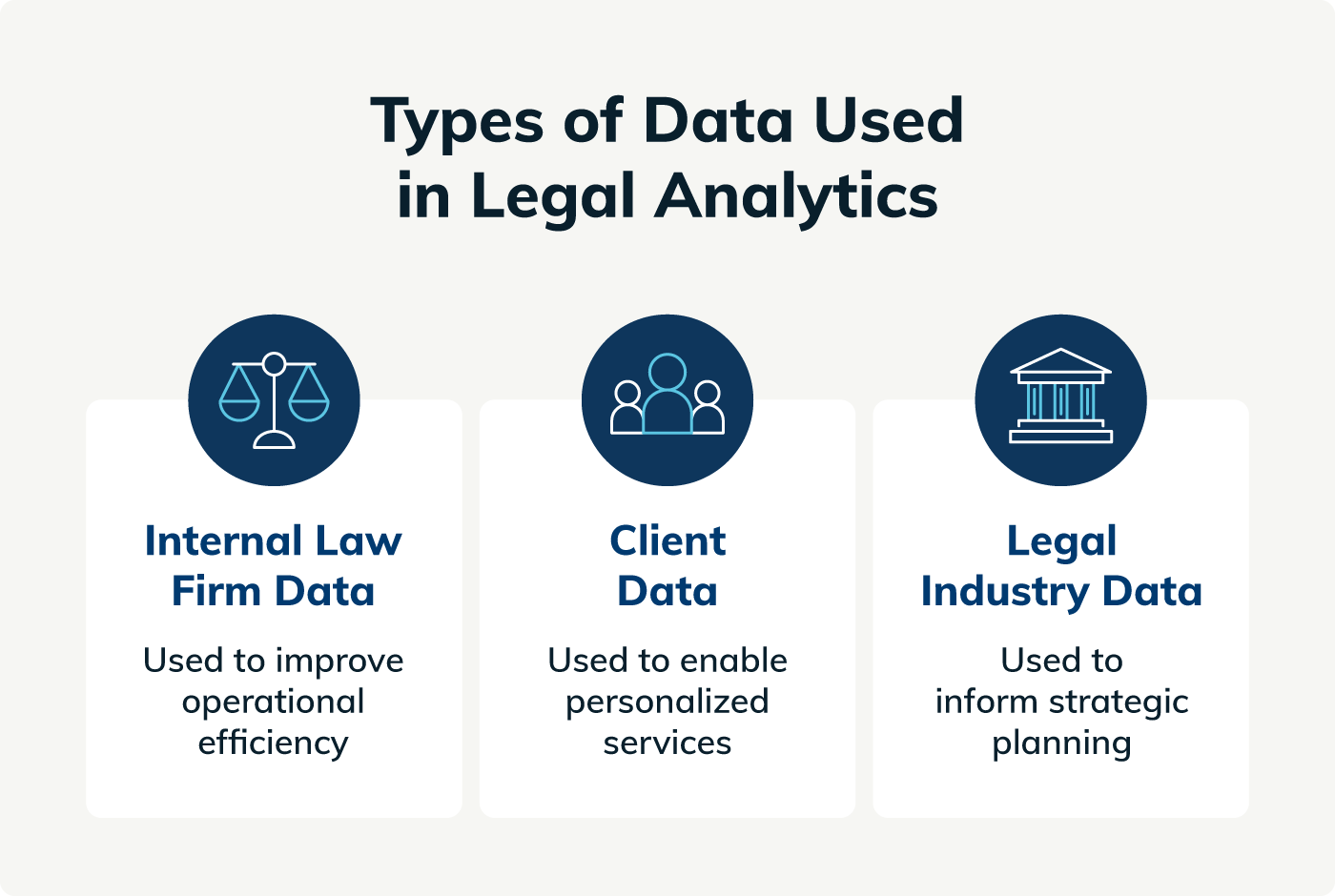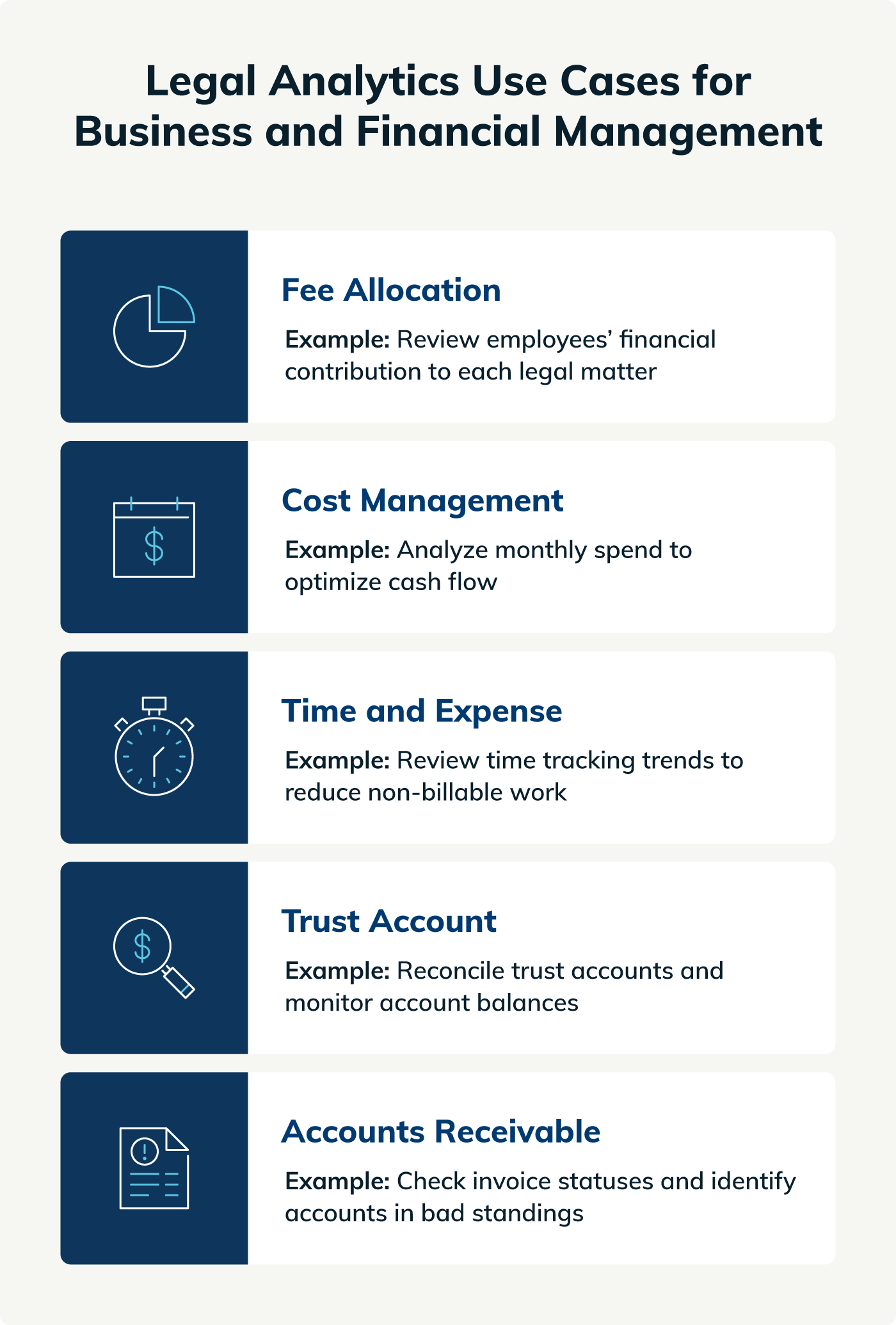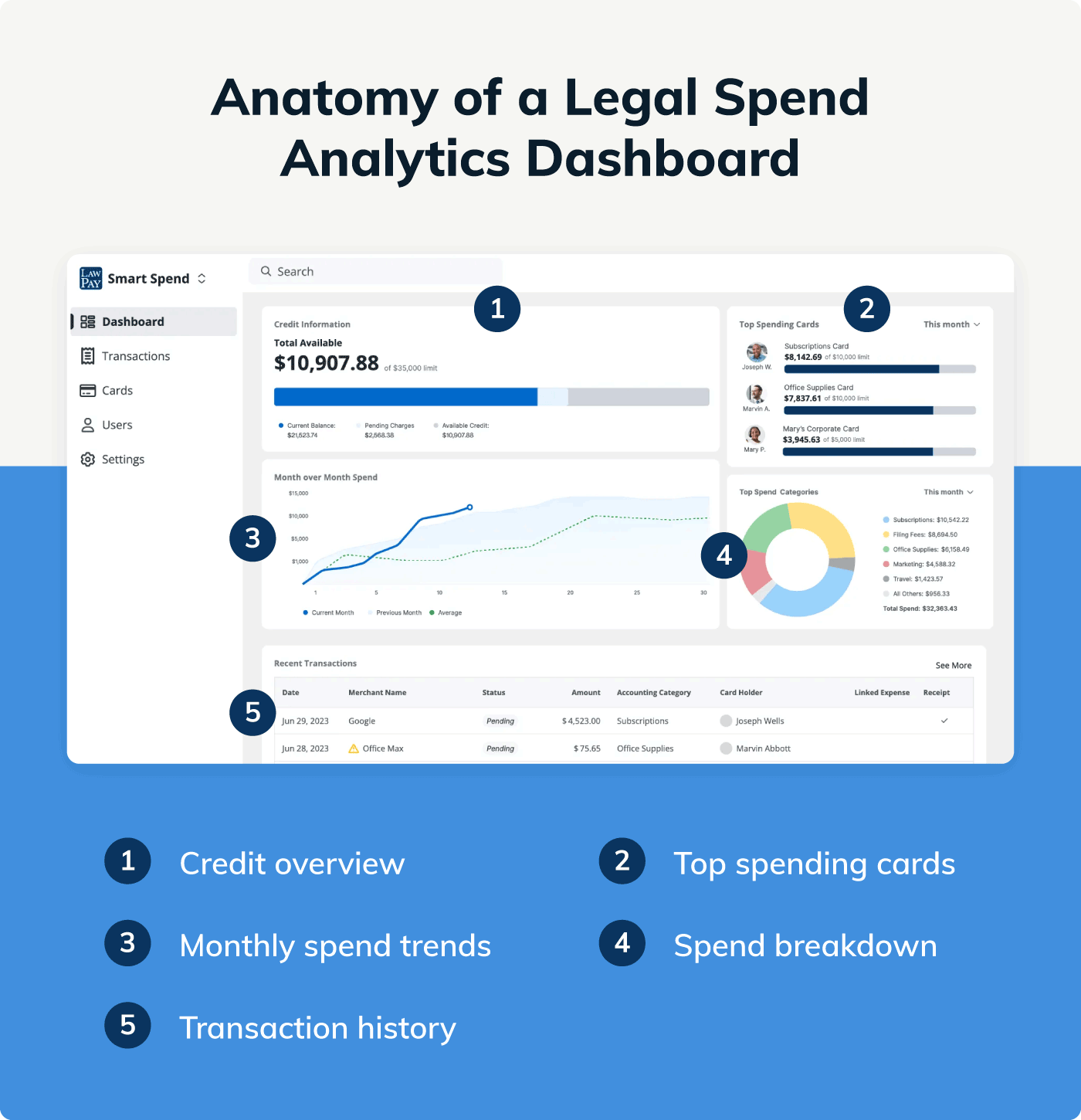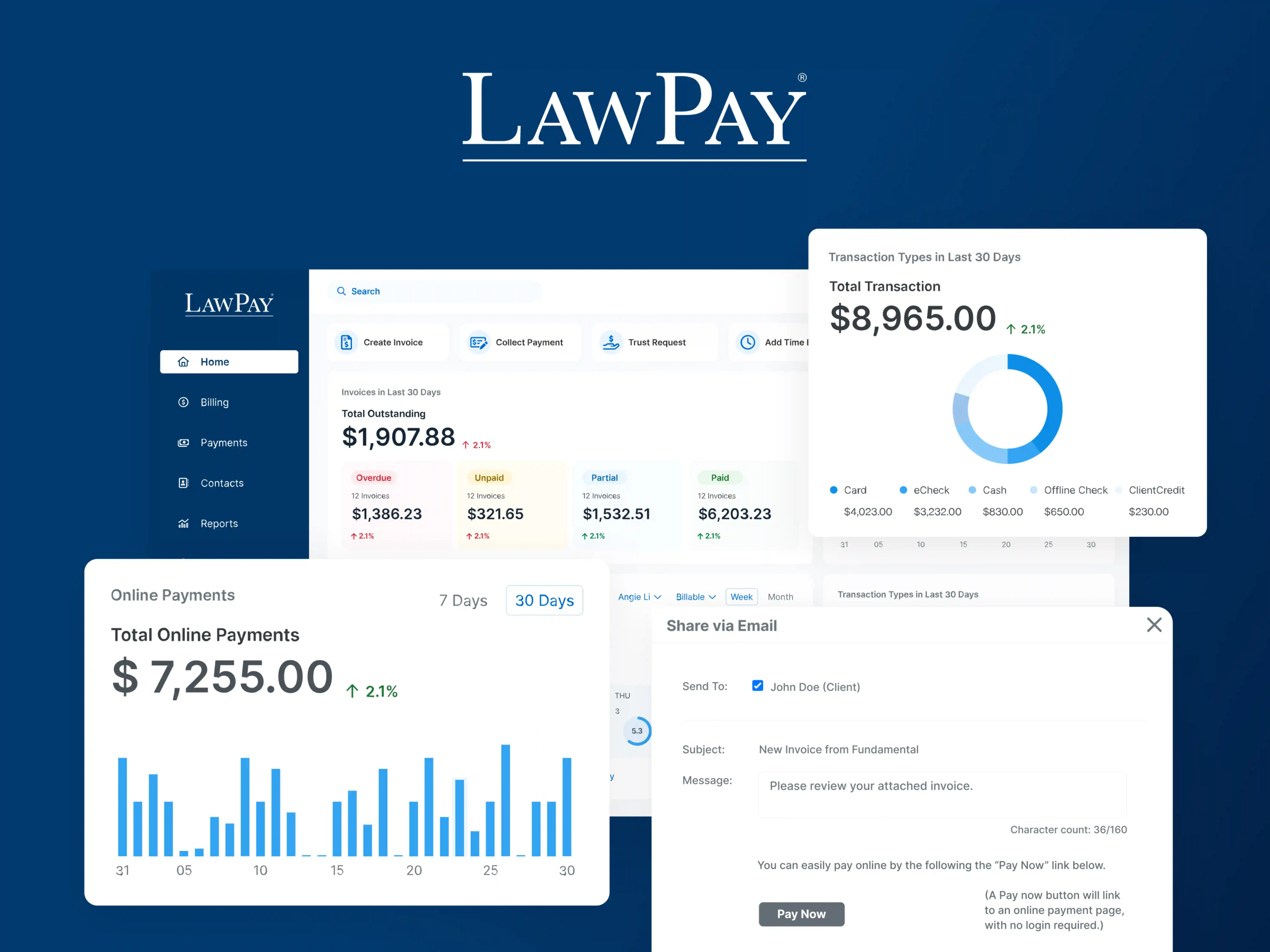Key takeaways
Understanding legal analytics: Legal analytics uses data and technology to extract insights that inform legal decision-making, improve case strategies, and optimize firm operations.
The key benefits: With legal data analytics, your firm can anticipate challenges, streamline processes, and ultimately deliver better client results.
How it works: It analyzes various data sets such as case outcomes, client behavior, and industry trends, helping you increase the efficiency and profitability of your law firm.
Legal professionals don’t just need technology—they need tools that save time and deliver meaningful insights. Enter legal analytics: a game-changing resource for law firms seeking smarter, faster ways to manage their practice.
By leveraging the power of AI to analyze complex data, legal analytics transforms raw information into actionable intelligence. This AI-driven approach not only streamlines decision-making but also uncovers patterns and predictions that help you focus on what matters most: serving clients and growing your business.
All in all, legal data analytics empowers you to work smarter, from predicting case outcomes to streamlining workflows. In this article, we’ll explore what legal analytics is and how this technology is reshaping legal practice and unlocking new growth opportunities.
What Is Legal Analytics?
Legal analytics consists of data analysis tools and technologies to extract actionable insights from legal information. This process involves examining various types of data to uncover patterns, predict outcomes, and make data-driven decisions. Data analytics in the legal industry relies on a diverse range of data sources, including:
Internal law firm data: This includes billing records, case histories, and performance metrics to improve operational efficiency.
Client data: It’s the individual data that provides insights into client preferences and trends, enabling personalized services.
Legal industry data: Here, we have industry data that examines broader trends, such as judicial decisions and market developments, to inform strategic planning.
How Legal Analytics Works
Legal analytics operates by aggregating and analyzing vast datasets using advanced algorithms.
For example, a law firm using LawPay’s legal reporting software and analytics tools could identify patterns in billing practices, such as the average time to payment across various clients, or uncover trends in payment delays by practice area.

How AI-Powered Legal Analytics Works
Legal data analytics powered by AI operates by aggregating and analyzing vast datasets using advanced algorithms.
For example, a law firm might use AI-powered legal analytics to evaluate past case outcomes based on judge rulings, opposing counsel strategies, or similar case precedents. The software could predict the likelihood of success for a current case, guiding the firm in crafting its legal strategy.
By leveraging AI, legal analytics doesn’t just crunch numbers—it provides actionable insights to help your firm make informed decisions faster and with greater precision.
What Is Legal Analytics Software?
Legal analytics software is a specialized tool designed to help law firms analyze complex legal data and gain actionable insights. Legal analytics software programs transform raw data into valuable predictions and recommendations. Such tools are often part of a broader suite of legal software that helps you stay competitive in a data-driven industry.
Currently, AI is at the forefront of legal analytics software, allowing law firms to process massive datasets, identify nuanced patterns, and deliver real-time predictions. This innovation allows law firms to assess risks, estimate litigation timelines, and even automate repetitive tasks like document reviews.
How Can Attorneys Use Legal Analytics?
Legal analytics can help attorneys in many ways, from streamlining case research to enhancing client relationships and improving firm operations. Here are eight key applications that illustrate how legal analytics can drive success across various aspects of your legal practice.
1. Case Research
Legal analytics speeds up and refines case research by automating the analysis of extensive legal texts—including precedents, rulings, and statutes. Legal text analytics can scan thousands of documents, identifying patterns and relevant cases in seconds.
With solutions like MyCase IQ, you can simplify case research and e-discovery by quickly summarizing documents and identifying key points within them. This enables you to prepare more effectively for client meetings, opposing counsel calls, or litigation.
2. Predictive Analytics
Predictive analytics can estimate case outcomes by analyzing past rulings, judge tendencies, and opposing counsel behavior.
For instance, you can use predictive tools to decide whether to settle or proceed to trial—giving your clients an edge through informed, strategic decisions. Predictive analytics also helps you allocate resources effectively, focusing on cases with the highest likelihood of success.
3. Client Management
You can use legal data analytics to analyze client data and preferences and offer more personalized services. This data-driven approach can help strengthen client relationships, enabling you to anticipate client needs and demonstrate value. Analytics also aids in segmenting clients by industry or case type—allowing you to tailor your offerings and focus on the most profitable clients.
4. Business and Financial Management
Legal analytics can also be used to optimize financial and other legal operations. For instance, you can use:
Legal spend analytics to track expenses and manage budgets.
Legal invoice analytics to streamline billing by analyzing payment trends and identifying discrepancies.
Legal pricing analytics to evaluate the profitability of contracts and fee structures.

5. Talent Management
Legal analytics can enhance talent management by evaluating employee performance, identifying skill gaps, and improving hiring processes. For example, you can analyze the success rates of teams working on specific types of cases to identify top performers or areas for training. It can also support your retention efforts by providing insights into workload distribution—enabling you to prevent burnout and foster a more engaged workforce.
6. Attorney Productivity
You can boost attorney productivity by leveraging data from legal analytics tools. Gaining visibility into workflow bottlenecks allows you to streamline processes and maximize output. This ensures attorneys spend less time on administrative tasks and more time delivering value to clients.
7. Risk Management
Legal data analytics can help you identify and mitigate risks by analyzing trends in litigation, compliance, and client behavior. For example, analytics tools can flag potential conflicts of interest or predict cases likely to result in unfavorable outcomes. Proactively addressing risks can protect your reputation and reduce liability while staying compliant with legal and regulatory standards.
8. Marketing
You can use data related to website traffic, content engagement, and lead conversion rates to identify what resonates with potential clients—and refine your marketing strategies accordingly. Analytics also helps you assess the ROI of your marketing campaigns—enabling you to focus resources on the most effective channels and grow your client base efficiently.
What Are the Benefits of Using Legal Analytics?
Legal analytics offers strategic advantages that go beyond individual tasks, empowering your firm to thrive in a competitive industry. Here’s how you can use data analytics in the legal industry:
Future-proof your firm: Adapt quickly to technological advancements, regulatory changes, and client demands. This will ensure long-term success.
Enhance decision-making: Make confident, data-driven choices in case strategy, resource allocation, and financial planning.
Improve transparency: Use clear metrics and reports to track progress, set goals, and build trust with clients and internal teams.
Foster collaboration: Share insights across teams, from legal staff to marketing and finance—for a unified, efficient approach.
Drive innovation: Identify patterns in data to develop unique, tailored solutions that differentiate your firm in the market.

With legal spend analytics capabilities, LawPay’s upcoming Smart Spend Dashboard makes it easy to manage your law firm’s expenses, receipts, and case costs in one secure place. See real-time insights to track spending and find ways to cut costs.
Sign up for LawPay’s Smart Spend waitlist to be among the first customers to take charge of their law firm’s expenses.
Should Attorneys Use Legal Analytics Software?
Yes, attorneys should embrace legal analytics software since it can help them stay competitive and deliver exceptional results. These tools help simplify complex data analysis with features like legal invoice analytics and automated reporting. They can also help you make informed decisions about case strategies, client management, and firm operations. A comprehensive legal SaaS guide can help you understand how to implement legal analytics software effectively.
Watch our webinar on Leveraging AI to Streamline the Practice of Law to learn how AI can streamline your law firm’s operations, automate and manage case tasks and timelines, and what current technologies your firm can use.
How Can Law Firms Choose the Best Legal Analytics Tools and Software?
You should focus on solutions that align with your unique needs, goals, and workflows. Prioritizing the right features ensures the tools will enhance efficiency, support decision-making, and deliver a strong return on investment—all while helping you meet your law firm KPIs.
In addition to basic features like legal text analytics and legal pricing analytics, here’s what you should consider:
Needs and goals of the tools: Identify what specific problems the software should solve, such as improving case strategies, managing client relationships, or optimizing billing.
Focus on law firms and your practice area: Choose tools designed for legal professionals, particularly those tailored to your area of practice.
Size, quality, reliability, and accuracy of datasets: Ensure the software provides robust, relevant data sources to generate reliable insights.
Ease of use and technical support available: Select tools with intuitive interfaces and responsive customer support to minimize downtime and learning curves.
Integration and compatibility with existing tools: Choose software that seamlessly integrates with your current systems, such as case management or billing platforms.
Use of automation, AI, and other time-saving features: Look for advanced capabilities, such as automated document review or predictive analytics, to boost efficiency.
Data security and privacy protocols: Confirm that the software complies with strict security standards to protect sensitive client and firm information.
Leverage LawPay’s Legal Analytics Expertise for Financial Reporting
Legal analytics transforms how law firms handle financial reporting, case analytics, and overall operations. Whether optimizing budgets, forecasting case outcomes, or enhancing client satisfaction, adopting legal analytics equips your firm to work smarter and deliver greater value.
LawPay’s legal software solutions also integrate seamlessly with your existing systems. Schedule a demo today to discover how we can help your firm unlock new efficiencies and success.
Schedule a demo to see what LawPay can offer your firm.
Book Now
About the author

Hannah DeFreitasSenior Content Writer
Hannah DeFreitas is a Senior Content Writer for leading legal software brands, including MyCase, Docketwise, CASEpeer, and LawPay—the #1 legal payment processor. She distills industry trends and data into strategic insights that empower legal professionals to streamline workflows, increase revenue, and gain a competitive edge.
